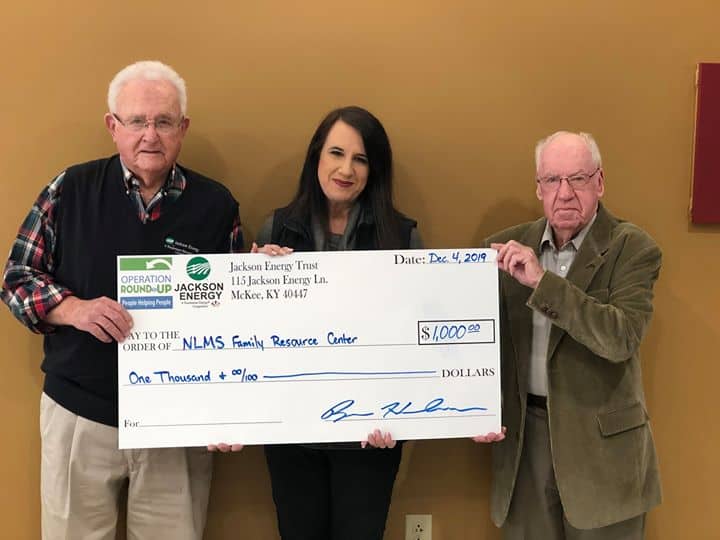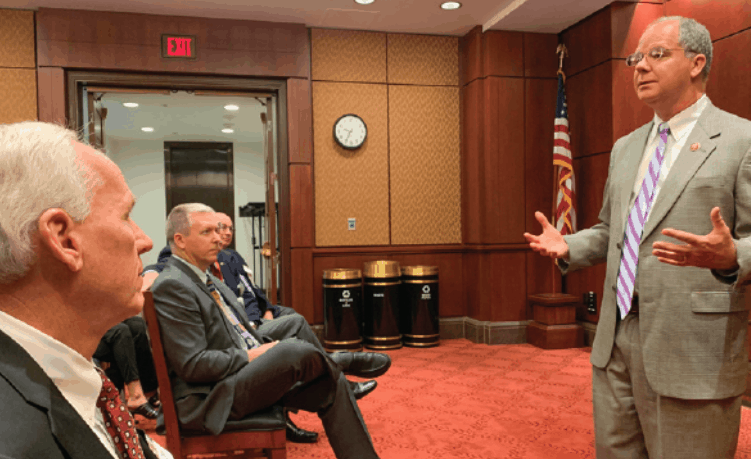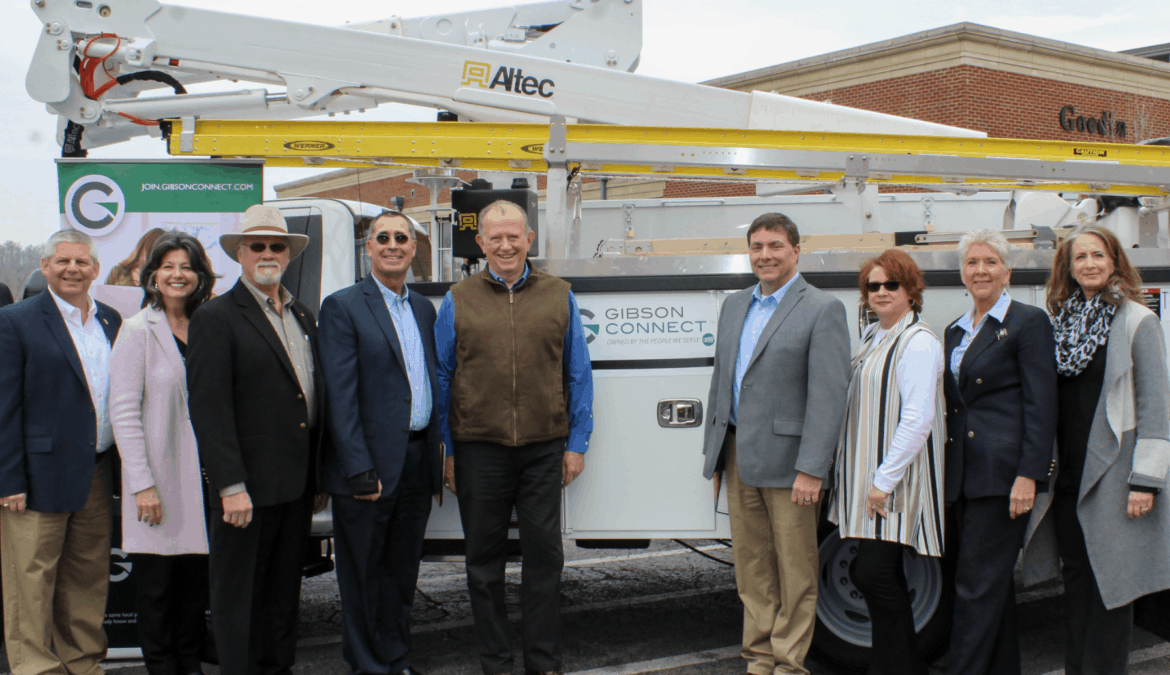Congratulations to North Laurel Middle School Youth Service Center who was recently awarded a $1,000 grant from Jackson Energy’s Operation RoundUP Fund. The North Laurel Middle YSC provides key necessities (such as food, clothing, school supplies and medical assistance) to their students that may need a helping hand throughout the year. Thank you North Laurel Middle YSC for making a difference in the lives of your students! For more information on Operation RoundUP, visit our website at https://www.jacksonenergy.com/operation-roundup.
Category: Coop News
Giving is a two-way street
Who receives the most by participating in the Honor Flight program? Is it the veterans who get to visit the war memorials in Washington, D.C., at no cost to them, or is it the volunteers who help make the trip possible?
Joe Garland, a Jackson Energy Cooperative engineer and U.S. Army veteran, is an Honor Flight guardian.
“It is quite an honor to escort a veteran back to see the memorials honoring their branch of the military,” he says. “We try to make sure it is a well-enjoyed trip. We want the veterans to get the respect they deserve but might not have gotten when they came home.”
At work, Garland gives back to the community as well. He surveys for new electric lines so homes, businesses and roads can be built.
Kentucky’s Touchstone Energy Cooperatives has sponsored the all-expenses-paid flight for veterans for the past nine years. To learn more about the program, go to HonorFlightKY.org.

OWENSBORO
It’s often the little things that make a difference, says Katie Risley, a volunteer with CrossRoads to Hope in Owensboro and a senior accountant for Big Rivers Electric.
Katie often volunteers for the nonprofit’s emergency overnight shelter for women and children. The shelter provides a hot meal in the evening and a place for the women and their children to shower and sleep. Volunteers help connect the women with services to obtain housing, employment, government assistance, clothing, medical insurance and a host of other needs.
“I will take a DVD from home and watch it with the women,” Katie says. “Often that is the best 90 minutes of their week. I take bags of socks I no longer need, and the ladies love picking out a pair. The little things that I take for granted, they really appreciate.”
But Katie says the benefits run both ways.
“I love being there,” she says. “I get a lot out of it.”

Photo: Stephanie McCombs
RURAL Act Victory: How Co-ops Saved Their Tax-Exempt Status
Shortly after midnight on Dec. 17, congressional leaders met behind closed doors at the U.S. Capitol to negotiate a last-minute budget deal that would prevent a government shutdown. What became clear by sunrise was that the deal also included the RURAL Act, a simple one-page bill that would retain the tax-exempt status of electric cooperatives.
“It was really touch-and-go until the last minute,” said NRECA’s Paul Gutierrez, who led the two-year lobbying effort to resolve the issue. “The overwhelming emotion I felt was relief. I was feeling good for our team and for our members that we weren’t going to have to go into 2020 with this hanging over our heads.”
Some co-ops were facing the prospect of paying taxes this year because of a provision in the 2017 Tax Cuts and Jobs Act that redefined government grants as income. Any co-op that accepted grants to restore service after storms or bring broadband service to rural communities risked losing its tax-exempt status by exceeding the 15% limit on non-member revenue. The RURAL Act’s passage fixed that.
Oregon Co-ops Get Creative
Oregon’s co-ops, battered by heavy winter storms in 2019 that knocked out power for thousands, were among those facing the loss of their tax-exempt status because they accepted disaster relief grants from the Federal Emergency Management Agency.
The co-ops and statewide association lobbied hard for Oregon Sen. Ron Wyden’s support for the bill, sending thousands of emails, writing letters to the editors of local newspapers and giving interviews to Oregon television stations. Winning Wyden’s support was crucial because he’s the senior Democrat on the Senate Finance Committee, which has jurisdiction over tax bills. He also ended up being one of the lawmakers in that all-important Dec. 17 deal-making session, along with Sen. Rob Portman, R-Ohio, the lead sponsor championing the RURAL Act in the Senate.
Just two days before that gathering, Ted Case, executive director of the Oregon Rural Electric Cooperative Association, attended one of Wyden’s town hall sessions in the state and presented him with a copy of the association’s magazine with the senator’s photo on the cover.
“The text on the cover said ‘Senator Ron Wyden is in a key position to help electric cooperatives. We’re counting on him,’” Case said. “That made an impression on him as a supporter of rural Oregon. The next day his staff called me and said the RURAL Act would be in the bill. If you’re going to lobby for something, you’ve got to go all-in and use everything at your disposal.”
Victory Grows From Year of Lobbying
While the victory was clinched in that late-night meeting of lawmakers, the moment was only possible because of intense lobbying and grassroots efforts by co-ops and NRECA that began a year earlier, said Louis Finkel, NRECA’s senior vice president of government relations.
“What got done in the end was really driven by what we did starting at the beginning of the year,” Finkel said. “Before we began lobbying on the RURAL Act, we were meeting with more than 100 new members of the House and Senate in Co-op 101 sessions to explain what co-ops are: that we are not for profit and that we serve the communities where we live. That conversation was the precursor to pass the bill.”
As Congress entered its August recess, NRECA and co-op leaders crafted a campaign-style approach to pass the bill, including media outreach and communications from co-op CEOs, directors, employees and consumer-members to tell their elected officials what was at stake.
Nearly 28,000 messages were sent to Congress through the Cooperative Action Network in support of the RURAL Act. In the end, more than two-thirds of the House and more than half of the Senate co-sponsored the bill. And when it came time for congressional leaders to decide which of the more than 100 tax-clarifying provisions would be included in the funding package, the RURAL Act was one of the few to make the cut.
“A lot of what made this possible was we had compelling stories from our members across the country,” Finkel said. “We were telling Congress: ‘This is a problem for real people in your states and your communities.’”
Small Co-op Brings Its Story to Congress
One of those stories came from Otsego Electric Cooperative in Hartwick, New York. CEO Tim Johnson realized early on that the 2017 tax law threatened his small co-op’s ability to bring high-speed internet service to its 4,000 members, many of whom live in impoverished areas.
He flew to Washington several times to lobby New York lawmakers, explaining that the co-op was at risk of losing its tax-exempt status because it accepted $10 million in state broadband grants. The co-op was facing federal taxes of as much as $2 million, along with other expenses associated with becoming a taxable entity.
“It was a hallelujah moment when the legislation was signed,” Johnson said. “I had many sleepless nights in December before that.”
Strategy Offers Lessons for Future
The bill’s bipartisan sponsors were also tireless in urging their colleagues to support the legislation. When NRECA CEO Jim Matheson reached out to House Ways and Means Chairman Richard Neal, D-Mass., Neal joked that he was tired of hearing about the RURAL Act because Rep. Terri Sewell, D-Ala., had been lobbying him constantly to support the bill. Sewell introduced the legislation in the House along with Adrian Smith, R-Neb. In the Senate, Portman led the effort along with Tina Smith, D-Minn.
“We were fortunate to have extraordinary champions,” Finkel said.
He said NRECA and its member co-ops will use the same campaign-style approach the next time they are lobbying on a major bill.
“This shows what we can do when we lock arms toward a common effort,” Finkel said. “Our entire co-op community should be proud of what we did and should celebrate their efforts in making this happen. But we know we can continue to improve on this model and build an even stronger grassroots network. That’s our objective for this year—we won’t be resting on our laurels.”
Erin Kelly is a staff writer for NRECA.
South Kentucky RECC CEO honored
SKRECC CEO Ken Simmons spoke to the Somerset/Pulaski Co Chamber of Commerce today about the co-op, the importance of community involvement and the co-op’s People Fund (round-up program that awards grants to organizations in our communities). Chamber President and East KY Power Regional Production Manager Troy Lovell presented Ken with a “Friend of the Chamber” plaque.
When people speak, Congress still listens
Kentucky legislators work to pass critical bill
Washington politics have become so polarized that it can be tough for Democrats and Republicans to come together to tackle big challenges. But that’s exactly what happened on Capitol Hill, thanks to dedicated Kentucky lawmakers like Senate Majority Leader Mitch McConnell and U.S. Reps. John Yarmuth, Hal Rogers, Brett Guthrie, James Comer and Andy Barr.
These legislators hail from different parts of the commonwealth and represent different political parties. But each listened to the concerns of electric cooperative stakeholders who spoke up about a critical need for America’s rural communities. The 2020 spending bill they approved included a provision known as the RURAL Act (Revitalizing Underdeveloped Rural Areas and Lands Act of 2019), which solved an existential issue for electric co-ops.
Electric co-ops work to secure government grants to help pay for numerous activities that benefit the communities they serve. These include grants for storm recovery, renewable energy and economic development.
Without the passage of the RURAL Act, federal disaster aid could have jeopardized the co-ops’ tax-exempt status if they faced another weather disaster like the 2009 ice storm. Thanks to our elected leaders, Kentucky’s electric co-ops are still eligible to receive this kind of assistance.
In standing up for Kentucky’s local communities, these lawmakers proved that Congress still works for the people. Notably, the legislation drew the bipartisan support of more than 300 representatives in the House and more than half of the Senate before it was passed. That’s a rarity in Washington these days.
In today’s fast-paced society, it’s increasingly rare to pause to give thanks. That’s unfortunate.
Thank you, Sen. McConnell, and Reps. Barr, Comer, Guthrie, Rogers and Yarmuth. Thank you for looking out for rural communities across Kentucky.


Owen Electric Board of Directors Appoints President and CEO
OWENTON, KENTUCKY – The Board of Directors of Owen Electric Cooperative is pleased to announce the appointment of Michael Cobb as its next president and chief executive officer. Cobb boasts extensive knowledge and experience in the electric cooperative industry, including 30 years spent at Owen Electric in accounting and member services; Cobb retired in 2018 as Senior Vice President of Member and Corporate Services.
“Mike successfully performed his duties while serving as Interim CEO for the cooperative, and in doing so, demonstrated exceptional leadership and decision making skills,” said Robert True, Board Chairman. “We are very thankful that he came out of retirement to serve.”
Cobb holds Bachelors and Masters degrees in Business Administration from the University of Kentucky and is a graduate of the University of Wisconsin’s Robert I. Kabat Management Internship Program offered by the National Rural Electric Cooperative Association (NRECA), an exclusive educational program for CEOs and top level management.
Having served as Interim CEO for since September 2019, the Board of Directors looks forward to serving with Cobb in leading Owen Electric forward.
“I love this Cooperative and am humbled and honored to once again have an opportunity to serve Owen Electric’s members and employees,” said Cobb. “I’ve spent over 30 years here and believe we have a noble mission as a Cooperative to improve the quality of life of our members and the communities we serve by providing safe, affordable and reliable electricity, while offering exceptional service to our members. I look forward to working alongside our dedicated team of employees as we strive to serve our members to the best of our abilities.”
USDA Invests $55.3 Million in Broadband for Rural Kentucky Communities
COLUMBIA, Ky.– Today, U.S. Department of Agriculture (USDA) Deputy Under Secretary for Rural Development Donald “DJ”LaVoy announced USDA has invested $55.3 million in four, high-speed broadband infrastructure projects in rural Kentucky. These projects, part of the first round of USDA’s ReConnect Pilot Program investments, will create or improve rural e-Connectivity for more than 12,250 rural households and nearly 100 farms and businesses across Kentucky and northern Tennessee.
“High-speed broadband internet connectivity, or e-Connectivity, is essential today to run a successful business or agricultural operation, access specialized health care or education, and connect with loved ones living far away,”LaVoy said. “Under the leadership of President Trump and Agriculture Secretary Perdue, USDA has made the deployment of this critical infrastructure in rural America a top priority, because we know that when rural America thrives, all of America thrives.”
LaVoy announced the following investments in rural Kentucky:
- Ballard Rural Telephone Cooperative Corporation will use a $2.4 million ReConnect Program grant to deploy a fiber-to-the-premises (FTTP) network in rural McCracken County. The funded service areas include 578 households and a critical community facility spread over 20 square miles.
- Duo County will use an $18.7 million ReConnect Program grant to deploy a fiber-to-the-premises network in rural Adair, Cumberland and Russell counties. The funded service areas include almost 3,650 households over 45 square miles.
- Gibson Electric Membership Corporation will use a $32 million ReConnect Program loan to deploy a fiber-to-the-premises network in rural Fulton, Graves and Hickman counties in Kentucky, and in Dyer, Lake, Obion and Weakley counties in Tennessee. The funded service areas include almost 7,400 households spread over 1,056 square miles.
- Thacker-Grigsby Communications will use a $2.3 million ReConnect Program grant to deploy a fiber-to-the-premises network in rural Breathitt County. The funded service area includes 637 households spread over 109 square miles.
Background:
In March 2018, Congress provided $600 million to USDA to expand broadband infrastructure and services in rural America. On Dec. 13, 2018, Secretary Perdue announced the rules of the program, called “ReConnect,” including how the loans and grants will be awarded to help build broadband infrastructure in rural America. USDA received 146 applications between May 31, 2019, and July 12, 2019, requesting $1.4 billion in funding across all three ReConnect Program funding products: 100 percent loan, 100 percent grant, and loan-grant combinations. USDA is reviewing applications and announcing approved projects on a rolling basis. Additional investments in all three categories will be made in the coming weeks.
These grants, loans and combination funds enable the federal government to partner with the private sector and rural communities to build modern broadband infrastructure in areas with insufficient internet service. Insufficient service is defined as connection speeds of less than 10 megabits per second (Mbps) download and 1 Mbps upload.
In December 2019, Agriculture Secretary Perdue announced USDA will be making available an additional $550 million in ReConnect funding in 2020. USDA will make available up to $200 million for grants, up to $200 million for 50/50 grant/loan combinations, and up to $200 million for low-interest loans. The application window for this round of funding will open Jan. 31, 2020. Applications for all funding products will be accepted in the same application window, which will close no later than March 16, 2020.
A full description of 2020 ReConnect Pilot Program funding is available on page 67913 of the Dec. 12, 2019, Federal Register (PDF, 336 KB). To learn more about eligibility, technical assistance and recent announcements, visit www.usda.gov/reconnect.
In April 2017, President Donald J. Trump established the Interagency Task Force on Agriculture and Rural Prosperity to identify legislative, regulatory and policy changes that could promote agriculture and prosperity in rural communities. In January 2018, Secretary Perdue presented the Task Force’s findings to President Trump. These findings included 31 recommendations to align the federal government with state, local and tribal governments to take advantage of opportunities that exist in rural America. Increasing investments in rural infrastructure is a key recommendation of the task force. To view the report in its entirety, please view the Report to the President of the United States from the Task Force on Agriculture and Rural Prosperity (PDF, 5.4 MB). In addition, to view the categories of the recommendations, please view the Rural Prosperity infographic (PDF, 190 KB).
USDA Rural Development provides loans and grants to help expand economic opportunities and create jobs in rural areas. This assistance supports infrastructure improvements; business development; housing; community facilities such as schools, public safety and health care; and high-speed internet access in rural areas. For more information, visit www.rd.usda.gov.
Green Station safety milestone
We’re keeping the safety milestones rolling! At midnight on January 19th, the employees of Green Station reached 11 years without a lost-time injury or incident. Green Station employees work in a wide variety of roles and environments, all tasked with ensuring the plant continues to generate safe, competitive, and reliable power. Congratulations to all of the Green Station employees who help build our safety culture. Reaching this milestone would not be possible without their commitment to work safe every day.
Operation RoundUP results
Our members are awesome! In 2019, Jackson Energy’s Operation RoundUP members (who voluntarily choose to round-up their monthly bills to the next dollar) were able to impact over 35 organizations with over $36,000 going back to their communities! A few cents each month adds up to countless benefits by funding grants for our local fire departments, senior citizen centers, youth service centers and civic organizations – just to name a few. Learn more about Operation RoundUP by clicking on the link https://www.jacksonenergy.com/operation-roundup – and don’t forget to RoundUP!
Youth tour winners recognized
SKRECC Mgr of Energy Services & Member Engagement Alan Coffey and Kentucky Electric Coops Dir of Events & Youth Programs Mary Beth Dennis recently traveled to area schools to present last year’s Washington Youth Tour winners with framed Kentucky Living Magazine covers with their photo. If you are a high school junior, see your guidance counselors or call (800) 264-5112 to speak to Alan Coffey for more information about the Washington Youth Tour!















